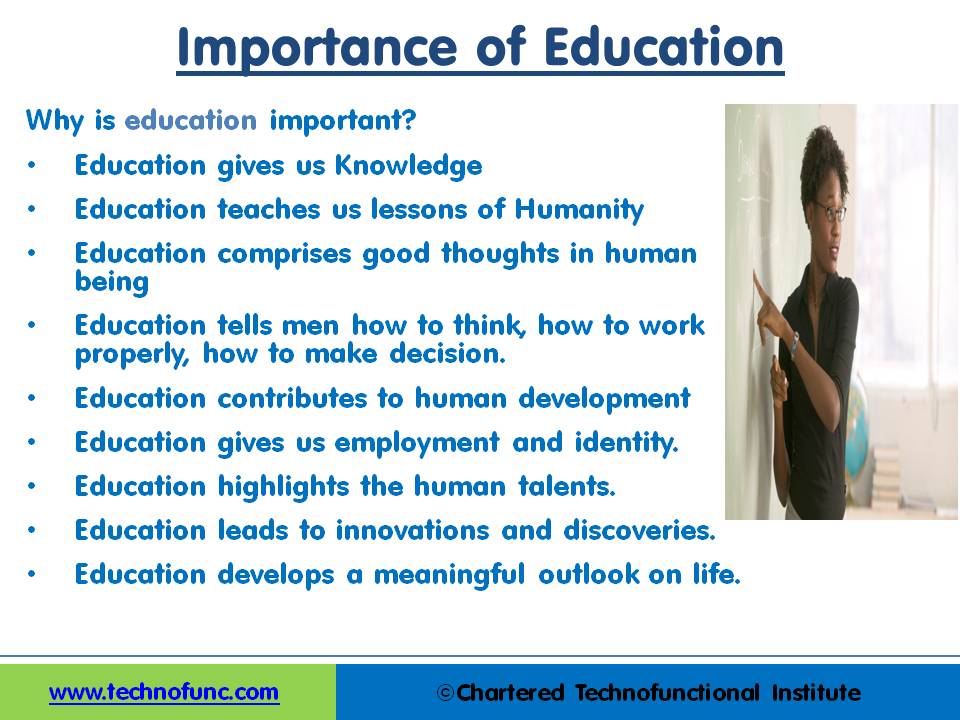
Nelson Mandela said: “Education is the most powerful weapon you can use to change the world”. The following article discusses some aspects that highlight the importance of the education industry for human society.
Education is a fundamental right
Education is a fundamental human right and essential to the exercise of all other human rights. It promotes individual freedom and potential and produces important development benefits.
The right of access to higher education is mentioned in a number of international human rights instruments. The 1966 UN International Covenant on Economic, Social and Cultural Rights states, in Article 13, that “higher education shall be made equally accessible to all, on the basis of their ability, by all means appropriate, and in particular by the gradual introduction of free education”. In Europe, article 2 of the first protocol to the European Convention on Human Rights, adopted in 1950, obliges all signatory parties to guarantee the right to education.
The normative instruments of the United Nations and UNESCO establish international legal obligations for the right to education. These instruments promote and develop the right of everyone to benefit from access to quality education, without discrimination or exclusion. These instruments testify to the great importance that Member States and the international community attach to normative action for the realization of the right to education. It is up to governments to fulfill their legal and policy obligations to provide quality education for all and to implement and monitor more effective education strategies.
Development tool:
Education is a powerful tool through which economically and socially marginalized adults and children can lift themselves out of poverty and participate fully as citizens. No human being can survive properly without education. Through education, only his potential can be utilized to the fullest. It tells us how to think, how to work properly, and how to make decisions. He gives us knowledge and teaches us the lessons of humanity. It nurtures good thoughts in human beings.
Education and human development:
It is generally assumed that formal schooling is one of many important contributors to an individual’s skills and human capital. The school occupies a special place, not only because education and the “creation of competences” are among its main explicit objectives, but also because it is the factor most directly affected by public policies. It is well established that the distribution of personal income in society is strongly linked to the level of education of individuals. Generally speaking, more schooling means higher lifetime earnings. These results appear over the long term. It is not people’s income during their studies that is affected, nor their income in their first job, but their income during their working life.
However, the application of education in different situations varies according to the basic mindset and intelligence levels of different people. Education is a productive and beneficial factor in a person’s life. The formation of a human mind is not complete without education. Education opens up different opportunities for human beings in terms of employment, social status and mental upliftment. Through education, only his potential can be utilized to the fullest. It leads to various innovations and discoveries.
Impact on economic growth:
The relationship between the literate labor force and economic growth is perhaps even more important than the impact of human capital and school quality on productivity and individual earnings. Economic growth determines the degree of improvement that can occur in the overall standard of living of a society. Moreover, the education of each individual has the possibility of improving the lot of others (in addition to individual benefits). A more educated society can translate into higher rates of innovation, higher overall productivity through the ability of firms to introduce new and better methods of production, and faster introduction of new technologies. These externalities provide an additional reason to be concerned about the quality of schooling.
Non-cognitive skills:
There is a whole set of non-cognitive skills that are important for success in economic life. It has become clear that society rewards non-cognitive skills such as honesty, reliability, determination and self-efficacy. Early research found that personality and behavioral traits such as persistence and leadership qualities had a significant influence on success in the job market, including earnings. Individual differences in personality explain substantial differences in income. The quality of education affects how quickly societies can get rich and the extent to which individuals can improve their own productivity and income.
Technical and vocational education:
Technical and vocational education offers an introduction to technology and the world of work within the framework of general education. It helps learners to acquire and develop the know-how necessary for a skilled trade and is essential for professional mobility, the improvement of professional qualifications and the updating of knowledge, skills and understanding. The technical and vocational education programs transmit the technical requirements of the relevant professional sectors and also provide the general education necessary for the personal and cultural development of the individual and include, among other things, social, economic and environmental concepts relevant to the profession. concerned. The clubbing of the theoretical and practical aspects of the technical field considered, through training or through professional experience in employment, allows the learner to acquire the practical experience necessary to successfully exercise the profession or occupation. Technical and vocational education prepares individuals to engage in meaningful professions to earn a living.
Education is the foundation of social and economic development; Overall, education develops a meaningful outlook on life. Many live in urban poverty or in remote rural communities, and young women in particular are unemployed or working for low wages. They need to be given a second chance to realize their potential by exposing them to a real education. Putting education to work can give young people a better start in life so they can approach the world of work with confidence.
Related links
You may also like Education System Challenges | History of Education and its Growth as an Industry | How to improve the education system | Importance of the education industry | Levels in the education industry | Overview of the education sector | Education Industry Sectors | What drives the education industry
Date Created Friday, December 21, 2012 Views 27201 Analysis Education Industry, Domain Knowledge, Education Domain Knowledge, Education Domain Knowledge, Education Industry, Education Industry Growth Education, Education Industry Overview, Education Industry Report, Education with Industry, Higher Education Industry Trends, Indian Education Industry Report education, education overview, report on education industry trends in India

